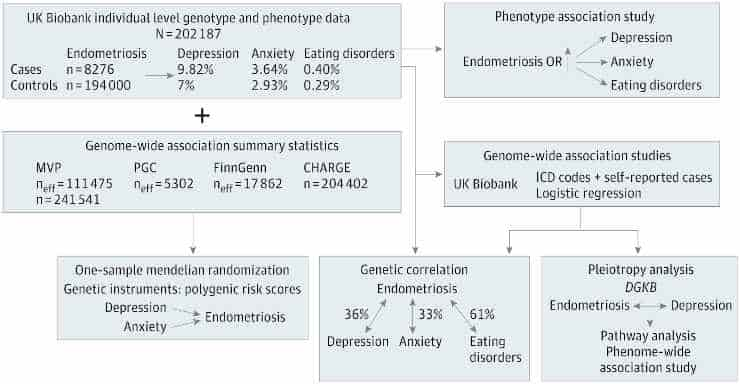Endometriosis is more than just a chronic pelvic condition; it is a systemic disease that affects the entire body. The largest epidemiological study to date on the psychiatric factors that can accompany endometriosis has now shown that depression, anxiety, and eating disorders are not only a result of the chronic pain caused by endometriosis, but also have their own underlying genetic mechanisms.
“It’s not surprising that having a genetic predisposition to endometriosis might include genetic alterations that affect other areas of the body as well,”
said co-author Hugh Taylor, MD, of Yale School of Medicine.
Endometriosis and Mental Health
The link between endometriosis and mental health is more complicated than researchers expected.
“The biological basis is not just chronic pain, and there is much more that we need to understand,”
said Renato Polimanti, Ph.D., associate professor of psychiatry and the study’s principal investigator.
In a previous clinical study, depression was found in 86% of the patients with endometriosis and chronic pelvic pain, but only in 38% of the patients without chronic pelvic pain. However, chronic pain doesn’t fully explain why more people with endometriosis have anxiety, depression, and eating disorders.
Goes Beyond Gynecological Disease
Endometriosis is a painful condition in which tissue similar to the uterine lining (endometrium) grows outside the uterus. Pelvic, abdominal, and low back pain, painful sexual intercourse, painful urination and bowel movements, constipation or diarrhea, heavy bleeding, bloating, fatigue, nausea, and infertility are all disease symptoms.
Some women may have flare-ups while menstruating, while others have symptoms daily. One in every ten women of reproductive age worldwide suffers from the disorder, but widespread misconceptions, even within the medical community, can make treatment difficult to obtain.
“For a long time, researchers thought it was just a gynecological disease, that it didn’t affect anything but female reproduction, and so women were often only treated when they presented with infertility. But we have to acknowledge that the effects of endometriosis extend far beyond reproduction.”
said first author Dora Koller, Ph.D., a postdoctoral researcher in computational genomics.
Wrong Explanations
According to Dr. Taylor, endometriosis and mental health disorders have long been linked in epidemiological studies, but researchers’ previous explanations were “often irresponsible” and shifted blame onto the patients.
“Correlation does not prove cause and effect. The inappropriate, wrong, and hurtful interpretation was often, ‘these are anxious people complaining about pain that all women have.’ They were wrong,”
he explained. Taylor added that when he treats patients, he makes sure not to look at endometriosis in isolation while ignoring its other symptoms.
Taylor’s research has focused on the systemic manifestations of endometriosis in various organ systems, including the brain, over the last decade. His research has shown that mood disorders in endometriosis are a component of the disease’s underlying pathophysiology using animal models.
“We clearly show that the disease causes changes in the brain that lead to anxiety and depression,”
said Taylor.
High Genetic Correlations
For this new study, the Yale researchers obtained data from the UK Biobank, which included more than 8,200 endometriosis patients and 194,000 healthy controls.

First, they looked to see if anxiety, eating disorders, and depression were more common in endometriosis patients, taking into account age, chronic pain, body mass index, socioeconomic status, various medications, and co-morbid conditions. They discovered that having endometriosis increases the likelihood of having these three psychiatric conditions significantly.
The team then wanted to look into the genetics of this association. Using genome-wide association studies, they discovered a significantly high genetic correlation between endometriosis and each of the three disorders after conducting a genetic correlation analysis.
They then performed a pleiotropy analysis to identify the shared genetic variants. This study discovered a genetic variant, DGKB rs12666606, shared by endometriosis and depression.
“This is a gene that is highly expressed in many brain regions as well as female reproductive tissue, which is very interesting,”
said Koller.
The study does have some limitations, the researchers acknowledge. For instance, the fact that people with chronic diseases tend to visit hospitals more frequently than people without chronic diseases may have an impact on the phenotypic associations seen. So, endometriosis could make it more likely that people with anxiety and depression get diagnosed.
Furthermore, due to the small sample size of other ancestry groups in the UK Biobank, the researchers only looked into people of European descent. More diverse samples will be required in future studies of the effect seen.
Raising Awareness
The team hopes its current study will help raise awareness about the lesser-known, far-reaching manifestations of endometriosis.
“It’s important for the public and health care providers to know there’s a common risk for endometriosis and mood disorders. Going back to the history of endometriosis, it has far too often been blamed on the patient — you’re too thin, you’re too anxious, you complain too much. It is not that. You are at increased risk for all of these conditions simultaneously based on your genetic makeup,”
said Taylor.
Koller and Polimanti are also researching the link between trauma and endometriosis. Koller has also recently launched a startup intending to develop a non-invasive diagnostic tool for the disease.
Because it takes women in the United States an average of 10 years to get a diagnosis for endometriosis, it is important to find non-invasive, less expensive, and faster ways to find out if they have it. This will save them years of unnecessary pain.
References:
- Koller D, Pathak GA, Wendt FR, et al. Epidemiologic and Genetic Associations of Endometriosis With Depression, Anxiety, and Eating Disorders. JAMA Netw Open. 2023;6(1):e2251214. doi:10.1001/jamanetworkopen.2022.51214
- Lorençatto C, Petta CA, Navarro MJ, Bahamondes L, Matos A. Depression in women with endometriosis with and without chronic pelvic pain. Acta Obstet Gynecol Scand. 2006;85(1):88-92. doi:10.1080/00016340500456118
